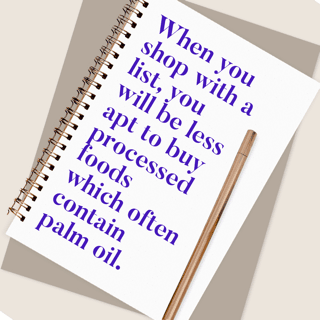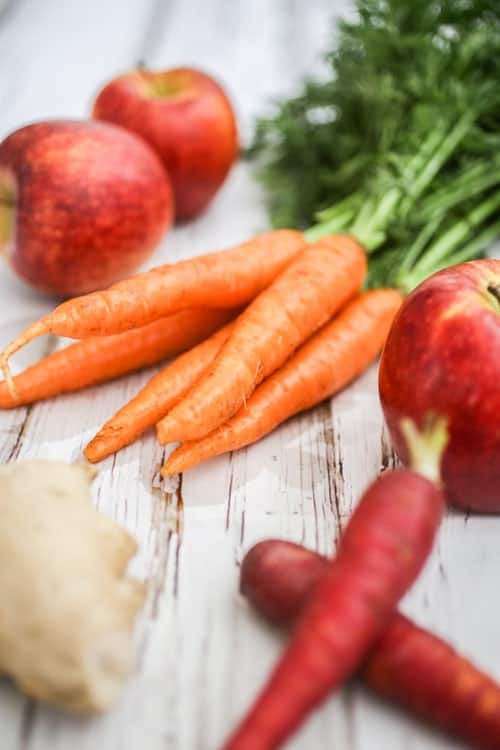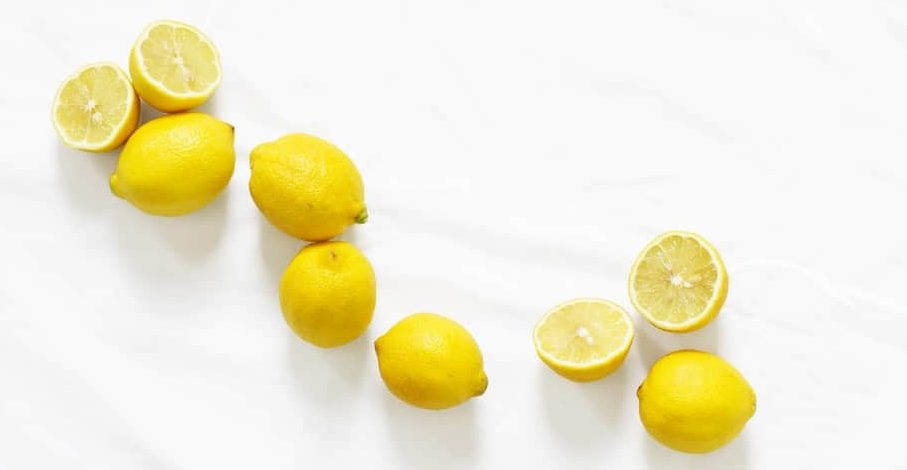Here’s how to use less palm oil each week. Each day, most consumers use products that contain it. However, there are easy things you can do to reduce demand.
You may be seeing “palm oil” on more labels than ever before. In the United States, much of the reason is the FDA banned companies from adding artificial trans fats to foods.
In our household, we limit palm oil as much as possible. The main reason we seek out palm oil alternatives is because our son gets sick from using products that contain it. Sometimes it causes him to have allergic reactions, other times, he gets sore throats, congestion, fever, etc.
It’s also a cause of environmental concern. Rainforests are cleared to make way for palm oil plantations.

How to use less palm oil
Even if you don’t give it up entirely, there are easy things you can do to use less.
1. Use less personal care products
For products you use daily, like toothpaste — which usually contains palm oil — try using a little bit less.
For personal care products, such as these below, try skipping a day, especially if you are just hanging out at home. Many times we use products out of habit.
- Shaving cream
- Bubble bath, bath bombs
- Body washes
- Lotion, moisturizers, creams
- Mouthwash
- Makeup, cosmetics, lipstick, etc.
As an example, if your habit is to slather lotion on after showering, skip a day, or use less overall.
Most self-care products typically contain palm oil. These include shampoos, conditioners, and soap as well. If you can’t skip a day, maybe you can use less of it when you use it.
If you can use one these products one less day a week than you usually do, that will extend the life of your product, thereby reducing demand.
Bars often use less palm oil than liquids. Choose to buy from companies that make certified palm oil free shampoos, conditioners, soap, deodorant, lotion, etc.
2. Eat less processed foods to lessen demand
Try eating a little bit healthier each week. Processed foods often contain palm oil. What can you cook or bake from scratch? What additional fruits and vegetables can you incorporate into your meals?
3. Use what you have
It’s common to find expired foods in cabinets and molding fruits and vegetables in the refrigerator.
We have a different habits now that we have larger refrigerators and more kitchen storage. Also, we have easier access to food than generations ago. Sometimes we stockpile.
Start trying to eat what you already have instead of going to the store to buy more food.
Freeze produce before it goes bad to use in smoothies, soups, or skillets.
4. Buy real foods when grocery shopping
When you shop, focus on buying real, whole foods.

Shop with a list
When you shop with a list, you will be less apt to buy processed foods that contain it. See our list of Costco foods we buy without palm oil.
Buy more fruits and vegetables
Pick up fruit and vegetables for snacks at home and as side dishes to your meals. There are many that are easy to pack to eat on the go. Some examples are grapes, bananas mandarins, oranges, snap peas, snow peas, carrots, etc. Nuts are also a portable snack.
Cook at home
Try to limit the processed foods you eat at home by making homemade meals a couple times each week. It doesn’t have to be complex. If you cook dinner four times a week, try making a little extra each time so you will have leftovers for the other days.
5. Determine what to eat at home and what to eat on the go
We often buy processed foods for school lunches, road trips, and for snacks. If you can reserve those snacks for when you need them — instead of snacking on them while you are at home — you will buy less processed foods overall.
Some examples are power bars and other snack and granola bars. Don’t eat these at home. Save them for when you are out and about and need a grab & go snack.
6. Read labels at home
Get familiar with the foods you are buying. Read the ingredients, and use less of the ones that have “palm” in them. Do you choose margarine, which contains palm oil, instead of butter, which doesn’t? Try using a little less one day a week.
7. Reduce consuming palm oil in drinks
Drink water instead of sports drinks.
Stopping for coffee
Do you stop for coffee every day? Try going one less day a week. Unless you are buying black coffee or tea, the coffee drinks likely contain whipped toppings, milk, creamers, etc. — all of which contain palm oil derivatives. Bottled coffee drinks do as well.
Vitamin A Palmitate is common in milk, creamers, and in milk alternatives.
Making coffee at home
If you regularly make your own coffee at home, one day a week can you use less creamers? They often contain palm oil, Vitamin A Palmitate, and/or Mono- & Diglycerides which are palm oil derivatives.
“Naturally Flavored” can mean it contains these ingredients as well. Buy whole beans and grind them at the store. They have this option at most major grocery stores and Costco.
8. Use less while cleaning
Dishwasher detergents and laundry detergents contain palm oil derivatives.
Run the dishwasher and clothes washer only when they are full. If you don’t have a full load, use less detergent.
Most all cleaning products contain palm oil. This is true for cleaning products that look eco-friendly, “all natural,” and green.
We found a few brands of palm oil free cleaning products for kitchens, baths, floors, dishes, etc.

Look online for ways to use baking soda, lemon juice, and vinegar for cleaning.
Use microfiber cloths wash floors. There is a company called Norwex who makes cloths you can use without any cleaners. You wet them and use them to kill bacteria. You can use them to wash floors, counters, sinks, windows, showers, bathrooms, etc. without any chemicals.
Why palm oil is more prevalent than ever before
Remember, palm oil and the hundreds of derivatives means it’s a versatile oil. It can be used in hundreds of ways, in hundreds of products.
It’s in everything from deodorant and medicine to desserts and candy.
It’s inexpensive. That’s why companies use it.
That’s also why food companies turned to palm oil to replace the inexpensive artificial trans fats they were no longer allowed to add to foods.
In addition, other food companies started adding it their products.
With all the attention it received for being inexpensive and very versatile, other companies — who weren’t adding artificial trans fats to their foods — also started using it.
Many did this for existing products and many started introducing it in their new products.
Ways to lessen palm oil usage
Remember, it’s a versatile oil. It has many uses which makes it attractive to companies. It’s also inexpensive, just like the trans fats were.
In addition to being so common in processed foods, it’s common in most types of household products, including personal care items, cleaning products, and more.
While it may be difficult for your lifestyle to avoid it entirely, buying less processed foods is an easy way to lessen demand.
When it comes to the personal care products you use, try using less of one (or more) of them each week.
Take a small step to look at your habits. What do you use a lot of? Is there any way of using less?
When you shop, find one new product without palm oil to replace one you have at home that contains it.
See these easy tips to find palm oil free products. See ultimate palm oil free products list.
Tips from palm oil free advocates
We asked leaders from companies who have certified all of their products Palm Oil Free to answer the question:
What tips do you have to reduce palm oil consumption?
Ethique
Brianne West, Founder and CEO of Ethique, certified all of their products Palm Oil Free through Orangutan Alliance. She answered:
“With palm estimated to be found in up to 95% of bathroom products, simply making the switch to palm-free personal care products has already substantially reduced my palm oil consumption.
Shopping for fresh produce at local farmers markets and green grocers also helps me avoid the palm oil in processed foods that is present in more than 50% of supermarket stock.”
Learn more in our interview with Ethique.
Mokosh
Marion O’Leary, Mokosh founder, certified their entire range of skincare products Palm Oil Free through Orangutan Alliance.
One of her tips for how to use less palm oil is to focus on the kitchen. She said:
“Palm oil is everywhere in packaged food because it is stable for a long time. So it’s added to virtually all snack foods, cakes, crackers, cookies, dips, butter substitutes, frozen dinners – basically all the convenience foods we have all become addicted to.
So one by one, start eliminating these from your shopping trolley and replace with real food. Learn how to make your own snacks, make food from scratch, and increase your fresh food intake. This is a win-win not only for the environment but for your health as well.”
Learn more in our interview with Mokosh.
The Eco Alchemist
Terri Kirkham is the founder + CEO of The Eco Alchemist. They have certified all of their products Palm Oil Free with the International Palm Oil Free Certification Trademark (POFCAP).
Here is what Terri said about minimizing palm oil use in her daily routines:
“It certainly isn’t easy as palm oil is such a widely used ingredient but I am an avid reader of ingredient lists. Having gone through the certification process, I can luckily identify most palm derived ingredients, which can be really difficult as a consumer as it is literally hiding in hundreds of ingredients.
Keeping things simple and choosing products with few ingredients is key. I cook a lot at home and avoid many processed foods. Canadian regulations have just improved to where palm oil is required to be listed as an oil used in food which is super helpful, however it is not required to be listed as a derivative in food or cosmetics. It would be great if there was legislation around that.
As for personal care products, I make everything for myself, with the exception of toothpaste which unfortunately I have yet to find palm free in Canada.”
Check out my interview with The Eco Alchemist. Ms. Kirkham discusses what it takes to source palm oil free ingredients.
Viva La Body
Jo Srbinovski is one of the founders and owners of Viva La Body, an Australian based skincare company. They have certified all of their products Palm Oil Free through Orangutan Alliance.
Very noteworthy and admirable is how Viva La Body stopped making their solid hair care products, their facial care products, and their water activated moisturizers because of an ingredient they could no longer source palm oil free.
Most companies who make certified Palm Oil Free bars use Brassica alcohol. Due to supply chain issues, it is no longer available palm oil free. Because of this, Viva La Body discontinued approximately 30 products!
She said, “The loss of this ingredient hugely affects a major part of their business.”
However, Viva La Body is staying true to their mission to be completely palm free. Wow!
In addition, they have a soap that they made in which they donate to Orangutan Alliance’s #MyStepToProtect project. Viva La Body donates at least one tree for every soap they sell to Orangutan Alliance’s initiative to plant and protect trees in the Leuser Ecosystem (Sumatra).
I asked Jo what tips she had to reduce palm oil consumption. She said:
“Always check ingredients labels before purchasing (download a palm oil free shopping app if you can). Wherever possible grow your own food and make meals from scratch. It’s tastier, cheaper and healthier for you!”
Learn more about Viva La Body in my interview with Jo.
Why lessen demand for palm oil
Palm oil is controversial. Many consumers avoid it for environmental reasons and to stop deforestation. In places like Indonesia and Malaysia, rainforests are burned down to establish palm oil plantations.
We originally started avoiding it because my son has reactions from palm oil. We consider him to have a palm oil intolerance or allergy because it makes him sick. These are the foods he enjoys and personal care items he can safely use.
There are likely ways here and there you can reduce your palm oil use each week. Thanks for being an Educated and Informed Consumer!

